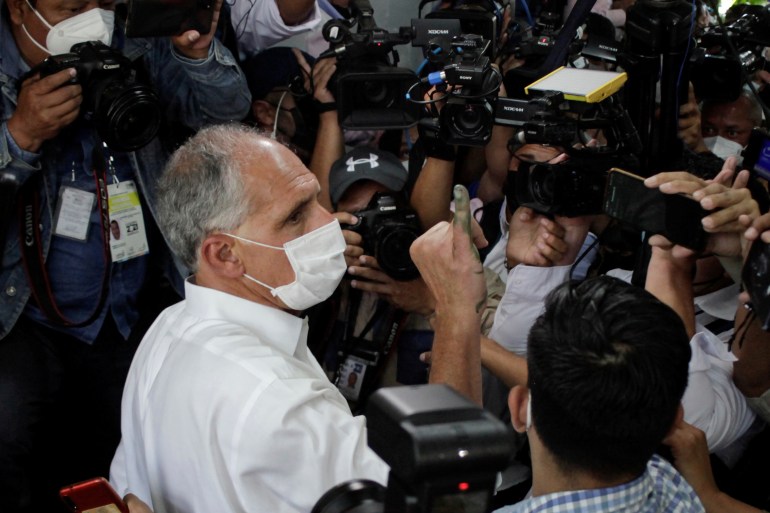Opposition leads after ‘massive’ turnout in Honduras election
Victory for Xiomara Castro would make her Honduras’s first female president and first from the left since 2009.

Initial results from the presidential election in Honduras show opposition candidate Xiomara Castro with a clear lead over conservative ruling party contender Nasry Asfura after both sides claimed victory after polls closed on Sunday.
Castro, whose running mate is Salvador Nasrala, declared herself the winner despite orders from the National Electoral Council to political parties to await official results.
Keep reading
list of 4 items‘Change is possible’: Honduras prepares for critical election
China blasts US ‘bullying’ over Honduras’ Taiwan ties
US bars Honduran ex-president Lobo over alleged corruption
“We win! We win!” Castro, Honduras’ former first lady who is making her third presidential run, told cheering Liberty and Refoundation Party (LIBRE) supporters when only a fraction of the ballots had been tallied.
The National Party also quickly declared victory for its candidate, Tegucigalpa Mayor Nasry Asfura, but the early returns were not promising.
With 45 percent of the polling station tallies in, Castro had 53 percent of the votes and Asfura 33 percent, according to the National Electoral Council preliminary count. The council said turnout was more than 68 percent.
If the opposition standard-bearer wins, she would become the first female president in Honduras and return the left to power for the first time since her husband, former President Manuel Zelaya, was overthrown in a 2009 coup.
The electoral council earlier said more than 2.7 million voters had already cast ballots, a figure described in a statement as a “massive turnout” with more votes yet to be counted.
The initial turnout is already higher than the 2017 total, said council president Kelvin Aguirre. But nearly 8 percent of 5,755 polling places were having transmission problems filing vote tallies with electoral authorities, which was expected to delay results.
A strong turnout has raised expectations of change after a dozen years of National Party rule.

Left-wing Castro has sought to unify opposition to outgoing President Juan Orlando Hernandez, who has denied accusations of having ties to powerful gangs, despite an open investigation in the United States linking him to alleged drug trafficking.
After allying with the 2017 runner-up, a popular TV host, most polls have reinforced her frontrunner status.
“We can’t stay home. This is our moment. This is the moment to kick out the dictatorship,” said Castro, mobbed by reporters just after voting in the town of Catacamas.
Long queues could be seen at many polling places across the country, where some 5.2 million Hondurans are eligible to vote.
The election is the latest political flashpoint in Central America, a leading source of US-bound refugees and migrants fleeing chronic unemployment and gang violence. Honduras is among the world’s most violent countries, although homicide rates have dipped recently.
Central America is also a key transit point for drug trafficking, and an area where concerns have grown over increasingly authoritarian governments.
The vote also has prompted diplomatic jostling between Beijing and Washington after Castro said she would open diplomatic relations with China, de-emphasising ties with Taiwan, the self-ruled island that China claims as its own.
‘This is Honduras’
Asfura, a wealthy businessman and two-term mayor of the capital, is Castro’s main rival among 13 presidential hopefuls. He has sought to portray his rival as a radical while trying to distance himself from the unpopular incumbent.
After casting his ballot, a measured Asfura said he would respect voters’ verdict.
“Whatever the Honduran people want in the end, I will respect that,” he said.
Some voters consulted by the Reuters news agency expressed dissatisfaction with their choices, but many others had clear favourites.
“I’m against all the corruption, poverty and drug trafficking,” said Jose Gonzalez, 27, a mechanic who said he would vote for Castro.
Hernandez’s disputed 2017 re-election, and its ugly aftermath, looms large. Widespread reports of irregularities provoked protests that killed more than two dozen people, but he rode out the fraud claims and calls for a re-vote.
Alexa Sanchez, a 22-year-old medical student, lounged on a bench just after voting while listening to music on her headphones and said she reluctantly voted for Castro.
“Honestly, it’s not like there were such good options,” she said, adding she was highly sceptical that the vote would be clean.
“I don’t think so,” she said. “This is Honduras.”


Numerous national and international election observers monitored Sunday’s voting, including the European Union’s 68-member mission.
Zeljana Zovko, the chief EU observer, told reporters around midday that her team mostly saw calm voting with high turnout, although most polling stations they visited opened late.
“The campaign has been very hard,” said Julieta Castellanos, a sociologist and former dean of Honduras’s National Autonomous University, noting that Castro has “generated big expectations”.
Castellanos said post-election violence was possible if the race proved especially close, if a large number of complaints were lodged, or if candidates declared themselves victorious prematurely.
Alongside the presidency, voters are also deciding the composition of the country’s 128-member Congress, plus officials for some 300 local governments.
In Tegucigalpa’s working-class Kennedy neighbourhood, 56-year-old accountant Jose, who declined to give his surname, said he would stick with the ruling party.
“I have hope Tito Asfura can change everything,” he said, using the mayor’s nickname.
“Look, here the corruption is in all the governments.”